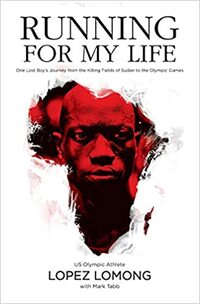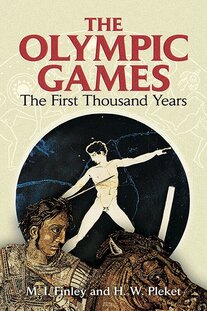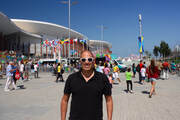So...over the holidays (told you I'm running behind), I finally caught up with two books that had long burned holes in my to-read pile. Both struck me as key pieces for my Olympic fandom, and I'm thrilled that I finally experienced them.
I'll share some quick thoughts:
Running for My Life (Lopez Lomong and Mark A. Tabb, 2012)
Subtitled One Lost Boy's Journey from the Killing Fields of Sudan to the Olympic Games, Running for my Life is just that: the telling of U.S. runner Lopez Lomong's dramatic life ahead of his second Olympic appearance at London 2012.

But Running for My Life is an autobiography, so we encounter this story in Lomong's own words and personal retrospection. And his telling of dramatic moments is poignant and inspiring. It's harrowing, to read his of his experience yet throughout, he maintains a positivity that belies any readers' discomfort. His charming wide-eyed-ness comes into best view as he settles, at times awkwardly, into a new life in the States and with a welcoming host family. From there, life is quick...his running prowess allowing him to integrate better than perhaps he would have otherwise.
Lomong eventually finished 10th in the 5,000 meters at the London Olympics. Since, he's added four national championships and two NACA Championships, and he is still active in running and humanitarian work.
His story is a powerful one, and an important one to consider when seeing the United States - and its national team - as a melting pot. His is a unique story, and his success is unique piece of Team USA's fabric.

Certainly, any true Olympics fan will want to be familiar with its origin story. And while The Olympic Games is a scholarly work, it's definitely readable. Reviewing a period from 776 B.C. to A.D. 261, the authors take us through the place and prestige of the Olympics at the time, juxtaposed with context of what was happening sociopolitically during these years.
Understanding the Olympics as one of four Panhellenic Games, including the Nemean, Pythian, and Isthmian, is a revelation. All four Games were held regularly, in fixed locations - the Olympics in Olympia - and the intervening years helped the Greeks measure time. Athletes, in general rule Greek and of means, routinely participated in multiple Games. Surprisingly or not, sponsorship and politics played a role as years went on and popularity grew, challenging some modern romantic notion of the ancient purity of competition. The Olympics, the largest of the Panhellenic Games, lasted into Roman rule, but eventually fell into disfavor.
Details abound in The Olympic Games, and fans should revel in the descriptive accounts of the competition and its respect. One aspect interestingly filled out is the legendary Olympic truce. Rather than a complete stoppage of war, it's more true that warring parties would allow athlete travel, and would respect a no-battle zone around competition sites.
It's a fascinating look at the times, and what the Games are thought to have been like, and have meant to the populace then. I'll be revisiting this book often as I continue to consider the modern Games.


 RSS Feed
RSS Feed